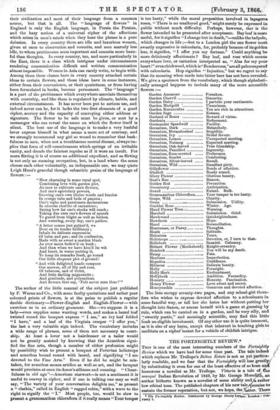THE LANGUAGE AND SENTIMENT OF FLOWERS.* Ifs the first place
there is no "language of Flowers." To justify such a phrase, there ought to be in all countries a well understood relation between certain visible qualities in the flower and human sentiment, which relation should not' vary except with a ohange in the nature of the flower itself. Of course no suck cipher exists, for the signs upon which it is to be based are not universally, or indeed very widely, distributed. The rose indeed _flourishes almost everywhere, and there are names for it in most of the perished languages, but the great majority of flowers and flower- ing weeds are as strictly confined by climate as fruits and limber trees. As well expect a wild daisy in.Bengal as a Newtown pippin or a Norway fir. Moreover, much of the " language " is based not upon qualities in the flower, but on its name, and there is for a very natural -reason no division of human speech so infinitely various as -the names of flowers. They have been named almost universally by the people, whose idea of a new word is .always something descriptive, as maidenhair, pheasant's eye, or sunflower. The Greeks considered thyme the emblem of courage, because its name expressed that quality, -bat it carries no such idea ta.the mind of the Englishman. The aspen signifies fear everywhere, because everywhere it shakes, but the "shepherd's purse" canhe and is the symbol of wealth only in Great Britain. No doubt there is a connection in the attributes ascribed to flowers in many countries, because many countries, notably Europe west of the Vistula, derive * The Language and Sentiment of Flowers. Compile" anI Edited by "L. V' • London Frederick Warue and Co. laGO. their civilization and most of their language from a common
source, but that is all. The "language of flowers" in England is only the English language, in Persia the Persian, and the hazy notion of a universal cipher of the affections which arises in men's minds when they hear the phrase is a pure delusion. In every country there are idle and luxurious women, given at once to observation and conceits, and men scarcely less idle, to whom prettinesses seem important and conceits more beau- ful than thoughts. In every country, too, and more particularly in the East, there is a class which intrigues under circumstances rendering communication difficult and written communication almost impossible. Women in AIM can rarely write, to begin with. Among them these classes have in every country attached certain ideas to certain flowers, and those ideas have in some instances, either from their convenience, or their quaintness, or from having been formulated in books, become permanent. The " language " is a part of the prettinesses which everywhere associate themselves with courtship, and like them is regulated by climate, habits, and external circumstances. It has never been put to serious use, and indeed never can be, for it lacks the two first elements of a good cipher, secrecy and the capacity of conveying either address or signature. The flower to be safe must be given, or sent by a messenger who can reveal the name on which the flower itself is silent. The best use of the language is to make a very bashful lover express himself in what seems a mere act of courtesy, and we strongly recommend any girl so wooed to remember that bash- fulness in men, when not a troublesome mental disease, always im- plies that form of self-consciousness which springs of an irritable vanity, and dreads the faintest repulse as if it were an insult. For mere flirting it is ef course an additional expedient, and as flirting is not only an amusing occupation, but, in a land where the sexes choose each other voluntarily, an indispensable one, we may quote Leigh Hunt's graceful though subsatiric praise of the language of flowers :—
"How charming in some rural spot, Combining love with garden plot, At once to cultivate one's flowers, And one's epistolary powers, Growing one's own choice words and fancies In orange tubs and beds of pansies ; One's sighs and passionate declarations In odorous rhet'ric of carnations; Seeing how far one's stocks will reach; Taking due care one's flowers of speech To guard from blight as well as bathos, And watering, every day, one's pathos.
"A letter comes just gather'd, we Doat on its tender brilliancy ; Inhale its delicate expression Of balm and pea ; and its confession, Made with as sweet a maiden blush As ever morn bedew'd on bush ; And then when we have kised its wit And heart, in water putting it, To keep its remarks fresh, go round Our little eloquent plot of ground!
"And with delighted hands compose Our answer, all of lily and rose, Of tuberose, and of violet, And little darling mignonette; And gratitude, and polyanthus, And flowers that say, Felt never man thus !"
The author of the little manual of the subject just published by F. Warne and Co., with some faulty quotations and rather poor coloured prints of flowers, is at the pains to publish a regular doable dictionary—Flower-English and English-Flower—with exercises as in an ordinary grammar. She—we suppose it is a lady—even supplies some wanting words, and makes a laurel leaf twisted round the bouquet express "-I am," an ivy leaf folded "I have," and a leaf of the Virginia creeper "I offer you,"
the last a very valuable sign indeed. The vocabulary includes a wide range of phrases, some of them not necessary to court- ship. At least a lover not a hairdresser or a tailor would not be greatly assisted by knowing that the Acanthus signi-
fied the fine arts, though a member of either profession might by possibility wish to present a bouquet of Peruvian heliotrope and acanthus bound round with laurel, and signifying "I am devoted to the Fine Arts." Even if he did he might be mis- taken, for acanthus means artifice as well as art, and the bouquet would proclaim at once its donor's silliness and cunning. "Cheer- fulness in old age "—American starwort—is not a sentiment it is
useful to convey in cipher, and if one is talking one may as well say, "The variety of your conversation delights me," as present a " elarkia," called in English "ragged robin," with a wave to the right to signify the "I." Most people, too, would be slow to present a grammanthns chloraflora if it really means "Your temper
is too hasty," while the moral proposition involved in lapageria roses, "There is no unalloyed good," might surely be expressed in public without much difficulty. Perhaps, however, that is the flower intended to be presented after acceptance. Bay leaf is more useful, for it signifies "I change but in death,"—unlike the tadpole, which changes in life ;—but to a London girl the one flower most sweetly expressive is calceolaria, for, probably because of its golden, hue, it signifies, "I offer you my fortune." Could anything be- more deliciously affectionate? Bay leaf, and rose which mean's everywhere love, or carnation interpreted as, "Alas for my poor- heart 1" evenchickweed, which is"Rendezvous," are all palecompared with cakeolaria. Hop signifies "Injustice," but we regret to say that its meaning when made into bitter beer has not been revealed.. We give a specimen from the vocabulary, which though alphabeti- cally arranged happens to include many of the more accessible flowers :-
Garden Anemone Forsaken.
Garden Chervil Sincerity.
Garden Daisy I partake your sentiments.
Garden Marigold Uneasiness.
Garden Ranunculus You are rich in attractions.
Garden Sage Esteem.
Garland of Roses Reward of virtue.
Gardenia Refinement.
Germander Speedwell Facility.
Geranium, Dark Melancholy.
Geranium, Horseshoeleaf Stupidity.
Geranium, Ivy Bridal favour. Geranium, Lemon Unexpected meeting.
Geranium, Nutmeg Expected meeting.
Geranium, Oak-leaved True friendship.
Geranium, Pencilled Ingenuity. Geranium, Rose-scented Preference. Geranium, Scarlet Comforting.
Geranium, Silver-leaved Recall.
Geranium, Wild Steadfast piety.
Gillyflower Bonds of affeotion.
Gladioli Ready armed.
Glory Flower Glorious beauty.
Goat's Rue Reason.
Golden Rod Precaution.
Gooseberry Anticipation. Gourd Extent. Bulk.
Grammanthus Chloraflora Your temper is too hasty.
Grape, Wild Charity. Grass Submission. Utility.
Gadder Rose Winter. Age.
Hand Flower Tree Warning.
Harebell Submission. Grief.
Hawkweed Quicksightedness.
Hawthorn Hope.
Hazel Reconciliation.
Heartsease, or Pansy Thoughts.
Heath Solitude.
Heleninm Tears.
Heliotrope Devotion, or, I turn to thee.. Hellebore Scandal. Calumny. Helmet Flower (Monkshood) Knight-errantry.
Hemlock You will be my death.
Hemp Fate. Henbane Imperfection.
Hepatica Confidence. Hibiscus Delicate beauty.
Holly Foresight. Holly Herb Enchantment. Hollyhock Ambition. Fecundity. Honesty Honesty. Fascination. Honey Flower Love sweet and secret. Honeysuckle Generous and devoted affection.
The lists occupy seventy-two pages, and any school-girl there- fore who wishes to express devoted affection to a schoolmate in some fanciful way, or tell her she hates her without putting her thought into Saxon, or amuse herself with a game at guessing by rule, which can be carried on in a garden, and be very silly, and "sweetly poetic," and seemingly scientific, May find this little book an eligible investment. Of any other use it is quite innocent, as it is also of any harm, except that inherent in teaching girls to meditate on a cipher meant for a vehicle of childish intrigue.































 Previous page
Previous page